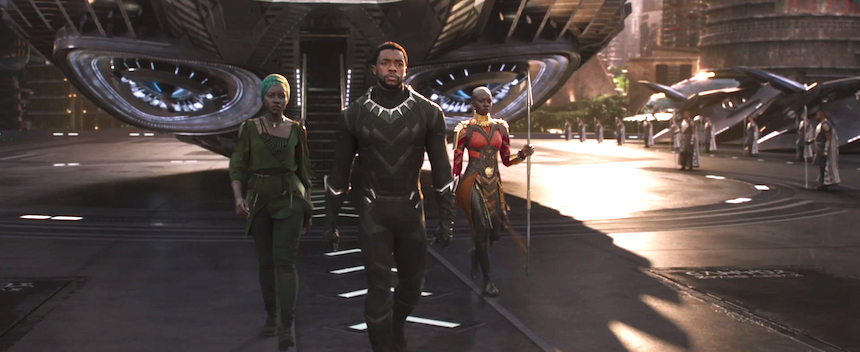Review: BLACK PANTHER, The King Has Arrived

Many people like to think that blockbuster and/or superhero movies are little more than fluff, an excuse to tap into a ready-made fan base and have some cool action scenes and colourful costumes to grab a large demographic market. But there are others who know that such big films can also have substance; that either overtly or covertly, then can be a reflection of the times we live in, present critiques of prevailing ideologies and attitudes both thematically and in their presentation. And this is happening, finally, when we get voices behind the camera that for too long have been excluded.
Black Panther, the first big studio film from Ryan Coogler (Fruitvale Station, Creed) is just such a film. As with Wonder Woman last year, Black Panther is not only is a kick-ass superhero film, it uses the platform to address deeper issues, in this case racism, still-lingering colonial attitudes towards Africa, the role of science and technology in improving the lives of the disadvantaged, and what it means to be a leader.
After the untimely death of his father, T'Challa (Chadwick Boseman) returns to his home of Wakanda (a fictional country in central Africa with such advanced technology that they have kept hidden from the world to sakeguard it), with his partner Nakia (Lupito Nyong'o) and his bodyguard, Okoye (Danai Gurira). Shortly after his coronation, he discovers that his father kept a dark secret from him that will threaten his kingdom. Meanwhile, an old adversary, Ulysses Klaue (Andy Serkis), is back helping another possible enemy, Killmonger (Michael B. Jordan), and T'Challa must fight them both to restore his rightful place.
The story fits well into the superhero mode, of a man discovering the full range of his powers (both natural and supernatural), and how to be a King. This is not an easy task: T'Challa believes in Wakanda and what it stands for (equality, community, debate), but is uneasy with some of the ideas of others among his people who want Wakanda to help those in the outside world, particularly those of the Black diaspora who are disproportionally disadvantaged.
The story examines and challenges the benefits of piecemeal foreign aid, the legal and illegal trade in arms, isolationism, and the meaning of loyatly. When two characters discuss each of these issues, the story is not necessarily taking a side, but asking that we at least have a deeper understanding of the issues before making any pronouncement.
And did I mention this was also a kick-ass superhero film? The film opens with a stellar fight between T'Challa and human traffickers, with Nakia more than holding her own and Okoye saving the day. Car fights, fist fights, gun fights, explosions, all perfectly timed and keeping the engine running. Director of Photography Rachel Morrison's work shines bright here, as she finds a new rhythm to the action that matches the movement of Black Panther himself, so we feel we are him in the fight. This is the same when the fight is focused on Okoye or her army, the Dora Milaje; the camera moves not so much to show them fight, as moves with them in the fight. Add to this Kendrick Lamar's music; the scenes may start with music that we're familiar with, but then it shifts to something entirely different, pushig us again to reconsider not only who is fighting, but how and why they are fighting.
And while this story is mainly about T'Challa, it is the women characters that steal the film. Katia is more than T'Challa's equal, fighting as hard as him, both in a physical fight, and fighting for her beliefs (in word and deed). Shuri (Leticia Wright) is the Disney princess that I've been waiting for my whole life: a complete science and tech genius (seriously move the f*** over Tony Stark), one whose innovations are only matched by her wicked sense of humour. Okoye and her army are warrior goddesses (I'd join the Dora Milaje tomorrow if they would have me), and Angela Basset, as T'Challa's mother Ramonda, puts all past movie queens to shame.
And all of this is wrapped in a perspective we don't see enough of in film, especially (if ever) mainstream film: Afrofuturism. A philosophy stemming from an African perspective on how we combine science and technology with tradition, custom, and the natural world, it is in full force in Wakanda; the technology works with nature, not pushing it aside but synching with it. Much of this comes from the attitude of a continent that was colonised for centuries, and the push against western ideology of 'progress' at any and all costs. This is most on display in Hannah Beachler's incredible production design (again enhanced by Morrison), lush and beautiful, full of futuristic machines and gadgets, while at the same time encorporating an older and more naturalistic content.
Helming such a film is no small task, and Coogler proves himself not only capable of putting together a stellar cast and crew, but steering them while allow their talents to shine. Black Panther is a feast for the eyes, the ears, the heart and the mind, a film that has action, heart, substance, and soul. The future of blockbuster films such as these lie with directors like Coogler (and Patty Jenkins, and Taika Waititi), ones who are bringing much-needed new life and ideas to the superhero genre.







